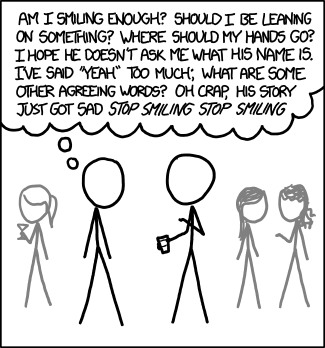Social anxiety
What is social anxiety?
Social anxiety (sometimes called social phobia) is an anxiety disorder and is a specific or general fear of something to do with interacting with people. It might manifest as a general fear of social events or social contact, or fear of a specific engagement.
Four ways of thinking
There are four ways of thinking that define social anxiety and all four are usually present; if you recognize all of them in yourself then you have social anxiety.
The first way of thinking is that you start thinking about the feared event long before it happens. You think of all the things that could go wrong and how it would be if it happened. The problem with doing this is that you experience the anxiety each of these thoughts, even when some of them are mutually incompatible – either this can happen or that can happen but not both, but you sense the anxiety as much as if they had both happened. And they are all experienced many times over so that by the time the event comes along, you have worked yourself up into such a state that you either go to the event, already very nervous, or possibly, you talk yourself out of going at all. Avoidance is a common reaction to being anxious and this seems quite sensible – after all, if you are scared standing next to that high cliff, then walking away from it will lessen your anxiety.

If you do make it to the event, then you will probably arrive in a state of some anxiety. When interacting with others, you believe that your anxiety and nervousness is obvious and that others will think less of you for being anxious. If you sweat then you will think it is pouring off; if you blush, then you are as red as a beetroot; and if you stammer or become tongue-tied that you won't be able to get any words out at all. You therefore monitor yourself to see if this is the case, which means you don't get to see that other people might be just as nervous, or that no-one is taking a great interest in you.
When talking to other people at the event, you rehearse what you're going to say, both the form of the words so that it comes out right and the content, to make sure that it won't give offence to the person you're talking to. The problem with doing this is that quite often you either censor themself or that someone else starts talking while you are rehearsing, so that you don't get to say it. People with social anxiety often think they are boring and because of this censoring and rehearsal, this may be self-fulfilling.
The final thinking distortion made is after the event, in the post-mortem. You focus on all that went wrong when you were there and ignore all that went well; you don't notice that all your anxieties about what would happen before the event didn't happen, and you don't notice that you enjoyed themself more that they expected to.
If you talk yourself out of going to an event because it is too scary, then this causes you two further problems. The first is that you have denied yourself the possibility of getting evidence about how you would be at the event, and so imagine the worst. But you also have the problem that when the avoided event is on, you will be aware of it – you might think less of yourself for not having gone, might imagine other people there having a good time, or even other people there talking about them for not being there. Avoiding an event therefore becomes worse than there not having been an event in the first place – a double whammy.